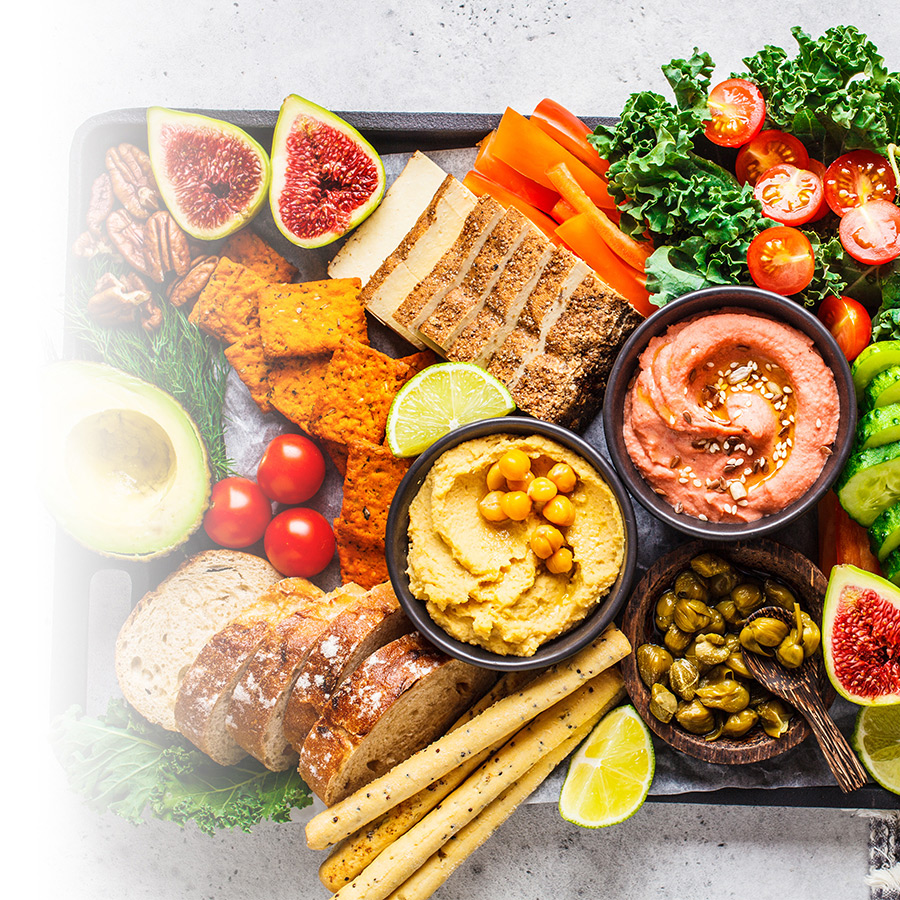Have you decided to become a vegetarian or vegan? Make sure you meet all your nutritional needs by making good choices.
Vegetarianism: an increasingly common choice
In the last few centuries, it was not uncommon for meat to be the centrepiece of a meal considered nutritious. Today, many people choose to give up meat to make way for a vegetarian diet. The motivations for this type of decision can vary: aversion to meat, refusal to contribute to the suffering and exploitation of animals, desire to reap the benefits of a plant-based diet, spiritual or religious beliefs, etc.
Vegetarianism seems to gain in popularity with each passing year. It has been shown that the overconsumption of red and processed meats can increase the risk of high blood pressure, cardiovascular disease and certain cancers, among others. This is an example of an incentive to reduce the consumption of these types of foods.
Vegetarianism or veganism?
A vegetarian generally refuses to eat animal flesh, including red meat, poultry, fish and seafood. There are various types of vegetarianism. For example, some vegetarians who refuse to eat red meat will eat poultry or fish. Others are happy to eat eggs and dairy products, but no animal flesh.
The term veganism refers to a person who abstains from eating any animal product, including eggs and milk. Their diet is based solely on plant sources. There are differences between these dietary approaches, but in the end, they are all about restricting the consumption of specific foods. Many scenarios are possible!
Veganism is also a philosophy that extends beyond food. It is a way of life that is based on the refusal to consume any product from animals or their exploitation. Its broad scope extends to many contexts: the manufacture of clothing, shoes, cosmetics and cleaning products, entertainment, animal testing, etc.
An adequate intake of essential nutrients
While it is possible to meet all of your nutritional needs on a vegetarian diet, it is important to be aware of the risks of nutritional deficiencies. As a general rule, vegetarianism focuses of the consumption of fruits, vegetables, and whole grain-rich foods. So, an adequate intake of dietary fibre is relatively easy to achieve. However, a person who practises vegetarianism must ensure that they are getting an adequate intake of iron, calcium, zinc, vitamin B12, vitamin D, and protein, and it is sometimes appropriate to consider supplementation.
Here are some examples of plant-based foods containing these nutrients.
Iron-rich foods:
- legumes (beans, lentils, dry peas, etc.)
- whole grain cereals
- green vegetables (asparagus, spinach, broccoli, etc.)
- dried fruits (apricots, prunes, raisins, etc.)
- tofu
Calcium-rich foods:
- almonds
- tofu
- beans
- spinach
- broccoli
- kale
- calcium-fortified beverages (e.g. water, soy milk or fruit juice)
- etc.
Zinc-rich foods:
- beans
- lentils
- nuts
- tofu
- raw wheat germ
- sesame, pumpkin or squash seeds
- etc.
Vitamin B12-rich foods:
- tofu
- sauerkraut
- shiitake mushrooms
- fortified beverages (e.g. soy, almond or rice)
- etc.
Since vitamin B12 is more difficult to find in plants, a nutritional supplement should be considered in certain cases (e.g. strict veganism).
Vitamin D-rich foods:
- fortified cereals
- fortified beverages (e.g. soy milk or fruit juice)
- certain types of mushrooms
Very few plant-based foods contain vitamin D. The best way to get an adequate daily intake of vitamin D is through moderate exposure of the skin to sunlight. Many Canadians do not get enough vitamin D, especially during the winter months, so many should consider a nutritional supplement.
Protein
Eggs and dairy products are protein-rich foods, which is an advantage for vegetarians who eat them. Those who do not would really benefit from eating protein-rich foods, such as the following:
- nuts
- grains
- soy beans
- legumes
- kale and spinach
- whole grain cereals
- tofu
Some sound advice
Here are some other tips for people who advocate a vegetarian or vegan diet.
- Check out Canada's Food Guide. This reference document is for all Canadians, including vegetarians and vegans.
- There are many books on the subject of vegetarian eating. Learn more so you can make the best choices for your health.
- Make water your preferred drink.
- Get the advice of a nutritionist to create a meal plan and discuss the need for a nutritional supplement.
- Before taking a nutritional supplement, speak to your pharmacist about the product choice, dosage, warnings, drug interactions and possible side effects.
- Avoid foods and beverages that contain added sugar or have poor nutritional value (e.g. pastries, chocolate, candy or soft drinks).
Remember that your pharmacist is always there to help you and to answer your questions about health!

